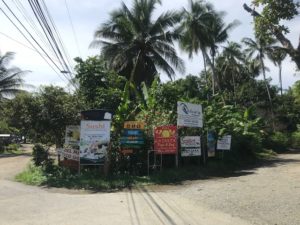 Antioch University Santa Barbara is currently offering a unique Field Study course in Costa Rica surrounding the nature of somatics (as a practicum course). The Concentration in Somatic Psychotherapy within the MA in Clinical Psychology Program gives all MACP students access to specialized training in integrating somatic approaches within clinical work. This particular field study is the first of its kind, as it focuses on group and dyadic work using current case presentations, discussions, and explorations of self.
Antioch University Santa Barbara is currently offering a unique Field Study course in Costa Rica surrounding the nature of somatics (as a practicum course). The Concentration in Somatic Psychotherapy within the MA in Clinical Psychology Program gives all MACP students access to specialized training in integrating somatic approaches within clinical work. This particular field study is the first of its kind, as it focuses on group and dyadic work using current case presentations, discussions, and explorations of self.
The first-course run was led by Elizabeth Wolfson, PhD, LCSW, a licensed practicing psychotherapist and Core Faculty and Director of Somatic Specializations at Antioch University Santa Barbara. With the course taking place in the depths of Costa Rica jungles and beaches, students were able to dive into the field of somatic therapy and other holistic therapeutic approaches.
Shifting Focuses

When we asked Dr. Wolfson why she felt that students should pursue a field study to enrich their learning her answer was simple, but revolutionary for the field, “What happens when your body is in motion? Anyone who goes on vacation knows that they are not in a familiar element—it’s the idea of transporting yourself—being on a plane, then exploring a place with different smells, scenes, and visuals—it all causes the senses to shift. Our bodies felt different in the humidity. The idea was to heighten awareness, and it worked.”
The most recent field study successfully synthesized elements of somatic psychotherapy with a range of educational tools and ideas, including assessment, cultural sensitivity, transference and countertransference, clinical intuition and the art and science of psychotherapy, and more.
“There’s been an abundance of recent evidence-based research surrounding body science and neuropsychology. There’s a distinct connection between emotions, thoughts, and the body—inside the world of psychotherapy, that’s shocking and new. What Somatics does is introduce the idea that we cannot separate patient-talk from what the body is saying. To me, that’s a wonderful thing. We’ve carried our bodies from birth. To ignore what our body carries and holds is a crucial mistake. You cannot treat deep trauma without taking note of that. There are only a handful of Somatics programs in the country, so I wanted to integrate it into all of the other knowledge and training that we’re doing with our students. It’s a concentration for those who are interested,” says Dr. Wolfson.
What Students Are Saying
 The student response to the meditation, breath-work, and mindfulness practices within the rich Costa Rican geography has been overwhelming.
The student response to the meditation, breath-work, and mindfulness practices within the rich Costa Rican geography has been overwhelming.
“It was the missing piece of the puzzle. It was why I went to Antioch. I wanted to know more about levels of stress, trauma, and disease, and how that manifests in the body. I was initially disappointed by it being at the end of the degree plan, but it makes sense now as it connected the dots for prior learning in the program. Looking back now, I wouldn’t change a thing. Having the experience in Costa Rica was the icing on the cake, for me it was life-altering. If you have an interest or curiosity about the connection between the mind and the body, this is the course for you. How we store trauma and experiences in our body changes how we react to things. Antioch is one of three universities in the U.S. that is offering this concentration. It’s such an effective way to do therapy, in addition to other modalities.”
– Lindsay Lookingbill
 “Initially, I was worried about the costs. I was borrowing money, so I was really nervous about the value of an additional quarter and delaying my graduation. Even without the Costa Rica trip, which was a great bonus, the somatic program helped me dive deeper into my practice and use the material that I’ve already learned in a more powerful way. However, I love having such a useful concentration. Thanks to this program, I can now say that I have personal and focused training in somatic psychotherapy. This branch of therapy is finally becoming more accepted and acknowledged by the medical and health industry at large. For anyone working with survivors of trauma, I say that the body is the most direct and logical instrument to work with clients. We store traumatic experiences in our bodies. Learning to read bodily indicators can alert clinicians in ways that we hadn’t expected, and can make all of the difference for clients with trauma—that’s the benefit of somatic psychotherapy.”
“Initially, I was worried about the costs. I was borrowing money, so I was really nervous about the value of an additional quarter and delaying my graduation. Even without the Costa Rica trip, which was a great bonus, the somatic program helped me dive deeper into my practice and use the material that I’ve already learned in a more powerful way. However, I love having such a useful concentration. Thanks to this program, I can now say that I have personal and focused training in somatic psychotherapy. This branch of therapy is finally becoming more accepted and acknowledged by the medical and health industry at large. For anyone working with survivors of trauma, I say that the body is the most direct and logical instrument to work with clients. We store traumatic experiences in our bodies. Learning to read bodily indicators can alert clinicians in ways that we hadn’t expected, and can make all of the difference for clients with trauma—that’s the benefit of somatic psychotherapy.”
– Nathan Ohren
“I think that somatic approaches are very valuable to the field. This particular class was a central part of my learning. Will I use this in my work? Absolutely. I plan to employ all that I have learned in my own sessions. It’s interesting––in a number of the courses that I’ve taken throughout the program in the last two years, several professors talked about how research has consistently shown the relationship between the therapist and the client is the most crucial factor; the personal relationship is above all else. This course gave me some new approaches and insights that illustrated this point. Both professors were great at interacting with “therapists” and “clients” in mock sessions; it was very valuable to observe their modeling of how to build rapport with a client.”
– Steve Elkins

